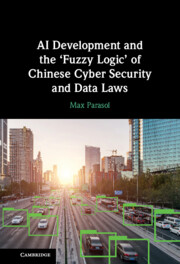Book contents
- AI Development and the ‘Fuzzy Logic’ of Chinese Cyber Security and Data Laws
- AI Development and the ‘Fuzzy Logic’ of Chinese Cyber Security and Data Laws
- Copyright page
- Contents
- Detailed Contents
- Acknowledgements
- Abbreviations
- Introduction
- Part I Historical and Doctrinal Background
- Part II Impact on Artificial Intelligence
- Conclusion
- Bibliography
- Index
Conclusion
Effect of Data Localisation on Chinese AI Innovation
Published online by Cambridge University Press: 16 December 2021
- AI Development and the ‘Fuzzy Logic’ of Chinese Cyber Security and Data Laws
- AI Development and the ‘Fuzzy Logic’ of Chinese Cyber Security and Data Laws
- Copyright page
- Contents
- Detailed Contents
- Acknowledgements
- Abbreviations
- Introduction
- Part I Historical and Doctrinal Background
- Part II Impact on Artificial Intelligence
- Conclusion
- Bibliography
- Index
Summary
Fuzzy logic is used by the Chinese government to balance its competing interests in creating an environment that is conducive to innovation and assisting its Network Sovereignty agenda. The book concludes that data localisation laws, which form part of China’s Cyber Security Law, will not (once the law is finalised) have a major impact on open-source AI innovation. This is because the ‘fuzzy logic’ regulatory approach, consistent with prior Chinese regulatory practice, is being employed by the Chinese authorities in selectively implementing these laws to avoid negatively affecting AI development. In short, the Chinese authorities, in presiding over contradictory policy and regulatory decisions that may inhibit technological advancement in China, apply this approach to flexibly navigate those policies – and frequently to defer any conclusive decision-making to a future time (perhaps indefinitely). This is why many legal documents, including both the Cyber Security Law and its implementing rules and regulations, use intentionally vague language around data transfers and security verification and testing; this gives the government broad discretion, allowing for a spectrum of enforcement actions between promoting innovation and maintaining control.
Information
- Type
- Chapter
- Information
- Publisher: Cambridge University PressPrint publication year: 2021
